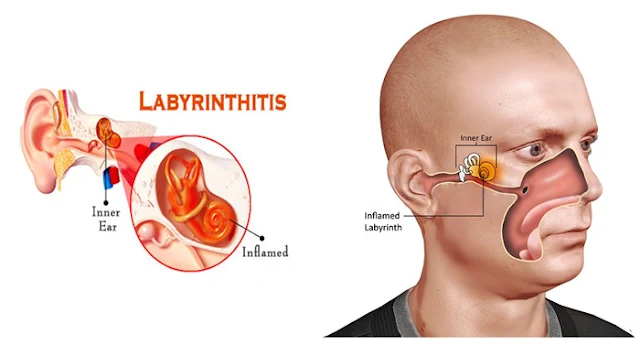Definition: Inflammation of inner ear as a complication of middle ear suppuration.
Etiology: As mastoiditis.
Pathology:
1- Labyrinthine fistula (circumscribed labyrinthitis):
Localized erosion of the bony labyrinth by cholesteatoma producing a fistula between middle and inner ears.
2- Diffuse serous labyrinthitis:
Accumulation of serous fluid in membranous labyrinth, still no pus.
3- Diffuse suppurative labyrinthitis:
Accumulation of pus in membranous labyrinth with degeneration of hair cells then:
- Healing by fibrosis (dead ear).
- Intra cranial extension of infection.
Etiology: As mastoiditis.
Pathology:
1- Labyrinthine fistula (circumscribed labyrinthitis):
Localized erosion of the bony labyrinth by cholesteatoma producing a fistula between middle and inner ears.
2- Diffuse serous labyrinthitis:
Accumulation of serous fluid in membranous labyrinth, still no pus.
3- Diffuse suppurative labyrinthitis:
Accumulation of pus in membranous labyrinth with degeneration of hair cells then:
- Healing by fibrosis (dead ear).
- Intra cranial extension of infection.
Clinical picture of Labyrinthitis:
-Suppurative otitis media - Clinical picture depends on stage:1- Labyrinthine fistula
- Silent.
- Vertigo: mild, transient, induced by sudden movement, tragal pressure, , no nausea or vomiting.
- Nystagmus, rapid phase………diseased ear.
- Positive fistula test (diagnostic)
- A test to detect labyrinthine fistula.
- Brief vertigo ± nystagmus.
- On: siegle, tragal pressure, manipulation of aural polyp.
- Positive test :vertigo ± nystagmus.
- False negative: (Very small, Non-functioning ear, Inadequate sealing, Cholesteatoma mass prevents pressure transmission).
2- Serous labyrinthitis
- Vertigo: Severe, continuous, spontaneous with nausea and vomiting.
- Nystagmus: Spontaneous ,directed to diseased ear.
- Reversible sensory neural hearing loss.
3- Suppurative labyrinthitis
- Similar to serous labyrinthitis but more severe.
- Irreversible SNHL (dead labyrinth).
- No or minimal general manifestation, as the amount of pus is too small.
- Distinction between 2 and 3 is retrospective.
Investigations:
1- Hearing tests
2- Culture and Sensitivity.
3- C.T
Treatment of Labyrinthitis:
A- Medical:
1- Hospitalization, rest, fluids.
2- Sedatives, antivertigo drugs.
3- Systemic massive antibiotics specially that crosses BBB: sulpha, chloramphenicol and cephalosporins.
4- Treat middle ear infection.
B- Surgical:
- In fistula: Mastoidectomy, remove the cholesteatoma and cover fistula with graft.
- In suppurative labyrinthitis with SNHL and vertigo: Surgical labyrinthectomy used to be done but nowadays it is obsolete due to powerful antibiotics, and need to preserve the skeleton of the cochlea for cochlear implant if indicated later.
- After vertigo settle, and undercover of parenteral antibiotics, radical mastoidectomy is done to control the source of infection.
References
References
